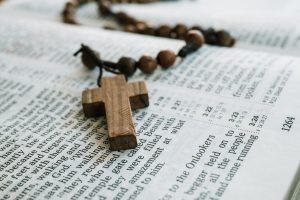Becoming a Pastoral Leader in
the Episcopal Church in Colorado
 A pastoral leader is a lay person licensed to exercise pastoral and/or administrative responsibility in a congregation. Pastoral Leaders are licensed to regularly lead the daily office services authorized by the Book of Common Prayer (BCP) as well as An Order for the Distribution of the Reserved Sacrament by a Pastoral Leader. This ministry is licensed under the provisions of the canon for licensed lay persons, and a pastoral leader must be a confirmed adult communicant in good standing in the Episcopal Church.
A pastoral leader is a lay person licensed to exercise pastoral and/or administrative responsibility in a congregation. Pastoral Leaders are licensed to regularly lead the daily office services authorized by the Book of Common Prayer (BCP) as well as An Order for the Distribution of the Reserved Sacrament by a Pastoral Leader. This ministry is licensed under the provisions of the canon for licensed lay persons, and a pastoral leader must be a confirmed adult communicant in good standing in the Episcopal Church.
Guidelines for selection and training of pastoral leaders are established by the bishop. A pastoral leader is to be trained, examined, and found competent in the Holy Scriptures, the Book of Common Prayer and Hymnal, the conduct of public worship, offering reflections on scripture, leading Christian formation, church history, the church's doctrine as set forth in the Creeds and An Outline of the Faith (BCP pp. 845-862), parish administration, appropriate canons, and pastoral care.
Pastoral leaders, once commissioned, are licensed for a period of three years.
Discernment & Application Process
Individuals feeling called to pastoral leader ministry ("seekers") should meet with a discernment priest for guidance and support. Seekers are also encouraged to explore resources for discernment found on the diocesan website. Following individual discernment, the priest may recommend taking the next step of meeting with a congregational discernment team. Details can be found by clicking the boxes below.
The pastoral leader application process opens March 1 and closes July 31. Formation for pastoral leaders begins in late August and continues through the month of May. The application is intended to help the Bishop and Canon for Formation & Pastoral Care get to know more about you, your faith journey, and your decision to take this step.
Pastoral Leader Formation
With the approval of the Bishop and Canon for Formation & Pastoral Care, candidates begin a nine-month time of formation. Pastoral Leader formation is offered annually beginning in late August and concludes the following May.
Pastoral leaders candidates are required to complete a broad course of training and study, with components that are academic, formational, and practical/experiential. Training is administered by the formation team of the Office of the Bishop in partnership with the Iona Collaborative (Seminary of the Southwest). Most of the materials are online and self-paced, with regular online and in-person opportunities for engagement with other ministry leaders and trainees. A three-day retreat is held at Cathedral Ridge during the second half of the training to continue formation in community and celebrate the gifts of the journey to pastoral leader ministry.
